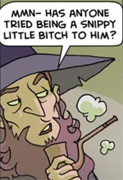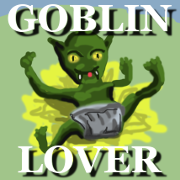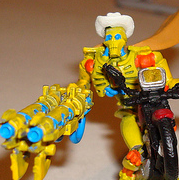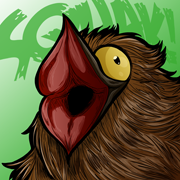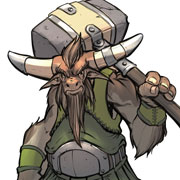|
So you've laughed at all the shenanigans in The TG Industry Thread done the math in the TG Design Thread and then actually took the advice in the Game Writing Thread and finished your amazing better than D&D Cyber-Steam-Fantasy-Sci-Fi-Cthulhu-Anime-Punk project. Now what the hell do you do? How do you transform your volumes of hand scribbled notes and sketchy stick figure diagrams into an actual book or PDF? Well Iím going to tell you. Your first option is to shop it around to publishers in the hope that theyíll do all the hard work for you, good luck with that. Your second option is to grab destiny by the short and curlys and publish that bitch yourself. Now youíre not just a game designer but also an entrepreneur! That will show your mom that all the time you spent rolling dice wasnít wasted. Fortunately for you, we live in a time when publishing your own crazy rantings is easier than ever. PDFs can be created for next to nothing, Print On Demand lets you print physical books in small runs, and the web lets you reach fans around the world with just the press of a button. This thread will help consolidate info about actually getting your awesome traditional game projects into real honest to goodness peopleís hands. It may also chronicle my own victories and defeats in self publishing. General Advice
Disclaimer - I am not an expert at self publishing, Iím in the middle of my first project and I've done a lot of research, but have not put everything into practice yet. Do your own research to verify anything you read here. If you have additional information youíd like added to the OP please let me know. Writing and Editing Your Masterpiece Really, if you havenít already go to the Game Writing Thread and read whatís there. Lots of people who know more than me have posted good info there. The hardest part of writing a game project is finishing, just sit down and put all your thoughts onto paper, then go back and re-write it all, then repeat until you hate yourself and this hobby, then youíre done. This is already fun! Word Processing Software - In case youíre new to this whole computers thing, hereís some suggestions for word processing software:
Once youíve got your words into a readable format, get yourself an editor. Lots of people think they can get away with doing all their own editing, theyíre wrong. First itís impossible to separate yourself from your work enough to be properly critical of it, and second a good editor does more than just correct typos and grammar, a good editor will help make your writing voice more consistent and smooth, theyíll make things more concise and improve clarity. Find yourself an editor, even if itís just a friend or family member who can proofread your manuscript it will improve your project. If you want to pay a professional editor, check goonmart, thereís at least one professional editor there that comes highly recommended. Giving and Receiving Good Art No matter how good your writing is, art will sell your game better than anything else. Good art will tell a potential player more about your game in an instant than a page of text ever will. You want art, but how do you get it, you might be tempted to just google image search ďbitchin artĒ and start downloading, DO NOT DO THIS, not only does it make you a huge rear end in a top hat but it sets you up for C&D letters and possible lawsuits. Hereís a few real options for acquiring game art: Be an artist or partner with one. This is probably the best option for a fledgling game designer, if you are, or can find, a good prolific artist who is into your project and wants to help in exchange for a piece of the action, offer them cookies and sign them up. your project will benefit the most from having someone who can create illustrations as you work on it. Hire an artist. Commissioning art is a topic that Iíll discuss at length later, but basically find an artist that does work you like and throw some money at them to make art for your project, When you do this make sure you have a contract in place that states ownership of the art and the associated IP. Where do you find artists? Well there are a lot of places:
Use Free Art. There are a lot of sources for free, public domain and Creative Commons art out there. Public Domain art is art that has no copyright and can be used freely by anyone for any purpose. Most often this art is old and has a lapsed copyright, but sometimes itís current and for whatever reason is not copyright. Creative Commons art is art that is licensed under a version of the Creative Commons Copyright. CC allows creators to share their work with others and dictate exactly how it can and can not be used. When using Creative Commons art, be sure to read the the specific CC terms that it is being offered with, some CC licenses have specific terms and requirements that you should be aware of. Here are just a few sources for public domain art: Wikipedia Wikipedia maintains a page of Public Domain Art. Thereís also a wiki page on sources for Public Domain art. National Gallery of Art - National Gallery has provided us a repository of Public Domain art images. Totally Free Images Hereís an interesting thing, the US Government is not allowed to copyright anything they create. This site is an archive of public domain images from government sources. The British Library - The British Library has provided a Flickr repository of Public Domain art. Project Gutenburg - a repository of free books, many with illustrations Layout and Design Ok, youíve got your words and youíve got your art, now you need to put it all together. Layout artists charge a lot of their time, and laying out entire books is very time consuming. Lucky for you weíre in not in the 20th century anymore, anyone can get the tools and knowledge to layout a book quickly online. Get yourself some desktop publishing software, take some time to learn to use the basic features and import your text and get to work. General Layout and Design tips:
Layout and Design Software
Itís Business Time Remember at the top of this wall of text where I said you were now an entrepreneur, well now youíve got to act like one. You need to take this seriously, mismanagement of your operation can not only cost you money, it can kill your fanbase and even open you up to lawsuits. If you havenít already go read the TG industry thread to see plenty of examples of poorly run companies, and the many creative ways they have found to gently caress things up. Incorporating Do you need to incorporate? Probably not. I did, but thatís because I had a partner and we both wanted to avoid liability. If youíre just one guy publishing Dungeon World classes itís going to be more money and hassle than itís really worth. If you do decide you want to incorporate, there are plenty of online resources that will help you do it. Budgeting You need a budget, you need a good budget, and you need to stick to it. The number one source of problems delivering products is a lack of proper budgeting. Figure out how much money you can afford to pay for things, write it all down and set your expectations appropriately. If you only have $100 to pay for art, then donít expect to get Todd Lockwood to paint your cover. Before committing to anything get a quote for production, get a quote for shipping, calculate taxes and any other additional costs, and then add 5-10% to the expected cost to cover any unforeseen complications. Trademarks and copyrights Iím not a lawyer, and if thereís one reading this that wants to correct me please do so, but this is my understanding of Copyright and Trademarks as they apply to self publishing games. Copyrights are there to protect you the creator from being ripped off. They allow you to defend your ownership of original creative work. Trademarks are there to protect consumers from being ripped off. They assure a purchaser that they are getting a genuine product from the trademark holder (or authorized partner) and not some cheap knock-off. Do I need to register a copyright of my game? Not really. Since 1989 every piece of creative work in the United States (and most every other country) is automatically copyright when it is created. As long as it is completely original work you donít have to do anything to claim these rights. Including a copyright notice in the document is always a good idea but no longer required. If you want to be 100% guaranteed of successfully defending your copyright if it is challenged then go ahead and pay the fee and register with the government, but itís really not worth the money. Should I trademark my game name? Yes, but itís not something you need to do immediately, once your game has successfully sold and youíve got people playing it, consider a trademark to protect yourself and your fans. Printing and Distributing Ok hereís what youíve been waiting for, youíve got your product written and designed, your cousin drew a cool unicorn for the cover, now all you got to do is get it printed, but Kinkos isnít going to cut it, you need a real printer.
Printers and distributors
Kickstarter If you haven't heard Crowd-sourcing is the new hotness in financing TG projects, everyone is making Go read the TG Kickstarter thread. Thereís a lot of good info in there, Iíll try to summarize it here. Some things to remember about Kickstarter.
Promotion -Twitbooks and Face+ Create a facebook page and a twitter account, find reasons to post on both of them as often as you can. You will be surprised how many people reach you through social media. OTHER RESOURCES Stonemaiergames Just about everything you could ever want to know about kickstarting a game. This post is a work in progress, if anyone has anything to add please let me know. Bucnasti fucked around with this message at 00:31 on Aug 5, 2014 |
|
|
|

|
| # ? Apr 20, 2024 02:16 |
|
Spirit of 77: a case study. This space reserved for stories about my hilarious attempts to self publish my first game.
|
|
|
|
Excellent OP, thanks Bucnasti! As someone who is working on his own RPG thing, this is incredibly helpful. Hopefully some people who have gone through the process can chime in on their own experiences as well.
|
|
|
|
Spincut posted:Excellent OP, thanks Bucnasti! As someone who is working on his own RPG thing, this is incredibly helpful. Hopefully some people who have gone through the process can chime in on their own experiences as well. I'm planning on doing a PDF product (compendium class compilation) in the next month or so, and with little or no money. What's the consensus on offering subcontractors (artists and editors) a percentage of revenue up to their full fee, with a small advance to make sure they get something ? Would that even be worth suggesting ?
|
|
|
|
mllaneza posted:I'm planning on doing a PDF product (compendium class compilation) in the next month or so, and with little or no money. What's the consensus on offering subcontractors (artists and editors) a percentage of revenue up to their full fee, with a small advance to make sure they get something ? Would that even be worth suggesting ? Not likely. If you personally know an artist that might be an option, but I doubt you're going to be able to find any decent artists that will work commission for maybe getting paid their rate. That said, you can find some pretty good commission artists out there who work for extremely reasonable rates. We used Jason Rainville for some art for one of our products and were extremely happy with the results. I don't remember the exact price but I was amazed at how low the price was. For the record it was a full-color, high-PPI, full-body character art, like Paizo's iconic characters. I'll see if I can find the image. EDIT: It isn't on his page and I don't see it in my GMail, so I must not have gotten an actual copy of the final art. Anyway, if you can't afford to pay reasonable fees, you probably should reconsider publishing for money. You're unlikely to make a profit. The old adage, "To make a small fortune in indie RPGs, start with a large one" is absolutely true. Zurai fucked around with this message at 04:14 on Aug 5, 2014 |
|
|
|
As the person who kinda sorta vaguely set the ball rolling on this thread, something I'd like to see is an in-depth explanation of the OGL and Creative Commons licensing. What does the OGL do and how does it work? Should you make your game OGL? Or Creative Commons? What do the various types of CC licenses do? If a system is under the OGL how do I go about using it for my own game?
|
|
|
|
So I want to take something I've got written up on Google Docs and turn it into a nice, pretty pdf. What are some good introductions to InDesign?
|
|
|
|
Fred Hicks (of Fate Core fame) just posted his Pinterest board of Kickstarter resources. There are currently 37 pins, ranging from how to plan Kickstarters, how to budget, success (and failure) stories, how to pitch something in a video quickly...I need to take a weekend soon to read through all of this. Thought you all would be interested.
|
|
|
|
Bigup DJ posted:So I want to take something I've got written up on Google Docs and turn it into a nice, pretty pdf. What are some good introductions to InDesign? Tasty Tuts' Adobe InDesign Tutorial.
|
|
|
|
Kai Tave posted:As the person who kinda sorta vaguely set the ball rolling on this thread, something I'd like to see is an in-depth explanation of the OGL and Creative Commons licensing. What does the OGL do and how does it work? Should you make your game OGL? Or Creative Commons? What do the various types of CC licenses do? If a system is under the OGL how do I go about using it for my own game? I have a broad understanding of Creative Commons, somewhere I found a webpage that explained it all really well, I'll see if I can dig it up. OGL is a blind spot for me, if anyone else has more insight and wants to post about it that would be grand. When I have time, I'll put together some effort posts about commissioning art and graphic design, two things I actually do know a lot about.
|
|
|
|
I've done work for multiple books which used the OGL, but I'm a designer, not an editor. I know the things I can't do as a designer within the OGL and the Pathfinder Compatibility License, but I don't know for sure that I could tell you which causes which restrictions. The thing that tripped me up with the PCL is that you can't reference page numbers. It made sense once it was explained to me (page numbers can change between editions of a book) but I never even considered that it would be verboten.
|
|
|
|
My RPG, Base Raiders, is OGL, because I used Strange Fate from Kerberos Club. I just copied the OGL license from Keberos, read through it and made appropriate changes. Main thing for OGL games is you have to identify what is open game content and what is product identity, which you do in the license. Open Game Content is what other people can reuse (if they reprint and use the same license) and product identity is protected material which is not usable without permission of the copyright holder.
|
|
|
|
Filming a Kickstarter video So we filmed our Kickstarter video, and I learned quite a bit. Do's
Don't
 We might be sweating like pigs, but at least we looked good doing it.
|
|
|
|
Bucnasti posted:Filming a Kickstarter video Another Don't
|
|
|
|
If you form up say an LLC or something while making a product, can you get tax deductions on what you commission for art or an editor? I know this is probably the wrong way to ask this, but anything to lessen the financial burden of producing a game (even if not immediate) could be super helpful.
|
|
|
|
Any suggestions on recruiting playtesters? Right now I've got a handful of mostly completed games, but I've been stalled on moving forward since the artist (and my wife) has been more or less crippled by medical issues. While we're trying to recover from that I've had ample opportunity to write and rewrite the rules but I'd really like to get some actual playtesting done. My personal gaming group is has a very unreliable schedule and when we do manage to game we've got an ongoing campaign. I've got a weird schedule (working nights) and minimal spare time which prevents me from seeking out any additional gaming group. But I haven't found any good way to get reliable playtesters who'll actually play the game and provide feedback. Any suggestions?
|
|
|
|
Brock Samsonite posted:If you form up say an LLC or something while making a product, can you get tax deductions on what you commission for art or an editor? Yes you can deduct pretty much any expenses from your taxes, and you don't have to form an LLC to do it. As I'm finding out, you can make a lot of deductions if you're publishing your own games, you can write-off purchases of game materials as research, if you're working from home you can write off a portion of your rent as your home office. Some things can't be written off right away though, for instance printing costs can't be written off until products have been delivered. Talk to a tax professional, find out exactly what you can write off and when you can do it. oriongates posted:Any suggestions on recruiting playtesters? Right now I've got a handful of mostly completed games, but I've been stalled on moving forward since the artist (and my wife) has been more or less crippled by medical issues. While we're trying to recover from that I've had ample opportunity to write and rewrite the rules but I'd really like to get some actual playtesting done. My personal gaming group is has a very unreliable schedule and when we do manage to game we've got an ongoing campaign. I've got a weird schedule (working nights) and minimal spare time which prevents me from seeking out any additional gaming group. But I haven't found any good way to get reliable playtesters who'll actually play the game and provide feedback. I also work nights on a weird schedule so I fell your pain in getting time to run playtests. In general just politely ask everyone you can, don't be pushy, just send out requests and somebody will respond. I've done a lot of playtesting with friends/family and co-workers. If you're excited about your project people around you will get excited about it as well. Even people who don't normally game will help you if you ask nicely and are enthused about your project. People who don't normally game are great testers, they'll often show you problems that experienced players will gloss over. One of my co-workers loved the game so much he and his roommate (who never played RPGs before) have been running their own mini-campaign for a couple months now. Posting here on the forums has been fruitful for me and for other game designers, I've put together a pbp game and a couple of online Roll20 games through SA. This forum is full of people who are eager to try new games. Asking for volunteer playtesters on G+ got us a group of regular AW players in another state to try our game out and give us a ton of feedback. We regularly run playtest games at a local game store, one time a friend of ours press ganged a couple random people at the store to play it with him.  We also run games at a local game convention, most events will give free passes to people running games. If your game is mostly finished, or if you have a demo package there are tons of podcasts that do lets play. Just write up a polite letter offering your game and see who is interested.
|
|
|
|
So I've been working on an RPG project for a while now, and I'm at the stage where I'm gathering together some art assets (just got my first commissioned piece via e-mail this morning, very exciting) and I've tentatively found someone who's agreed to do the layout at least for the earlier stages of the project. Now I'm looking to find an artist to design some trade dress - a cover template, borders, and sidebar boxes. Does anyone have any advice on where I should be looking and/or what I should expect? Or how I should communicate what I'm looking for, for that matter?
|
|
|
|
I've got a half written post/article about commissioning art that goes into a lot of nitty gritty details, but I won't have time to finish it for a while. Till then here is some specific info for you Flastaff. Layout can be really expensive, and it's completely unnecessary until you're ready to publish your final project, for playtests and demo's you can just put everything into a PDF with no images and people will be fine with that. I do my own layout, so my playtests and demos look a lot more complete then they need to. A friend of mine sends out all his playtest docs as just word docs right from his working drafts and nobody complains. For Trade Dress, my first suggestion would be to go to SA-Mart or the Work for Hire thread in Creative Convention, there are a lot of good goon artists looking for work and they're usually pretty reasonably priced. Another option is Deviant Art. It's a lot more work on your end because you have to weed out all the garbage submissions but a post in Job Offers forum will get you a ton of responses, some of which will be good, and occasionally something amazing. For your solicitations at the very minimum include this information: - How many pieces you need. - How big, what resolution, how many colors each piece will require. - Your deadline for completing the project - Your budget for the project, if you're flexible on the price you can state that it's negotiable, but still state a minimum price you're willing to pay for the whole project. - How you will be paying for the project (Paypall, check, etc) Once you've found an artist you like who's able to fulfill your request work out all the details with them ahead of time, make sure it's crystal clear what everyone's expectations are at the start so there's no dispute at the end. If you want one I can find the template contract I use for my artists.
|
|
|
|

|
| # ? Apr 20, 2024 02:16 |
|
Thanks for the info, that's helpful. I'll probably post to SA Mart for my needs, like you suggest. A template contract would potentially be incredibly useful, if you feel like digging it up. (Very generous of you to offer, incidentally.) So far everyone I've been dealing with is comfortable without a contract as long as I'm able to make it clear what I'm looking for and what I'm offering in exchange, but I expect sooner or later I'm going to need to start dealing with contracts as the project progresses.
|
|
|


